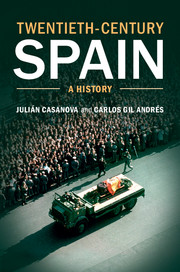Book contents
- Frontmatter
- Contents
- List of illustrations
- Key figures
- List of abbreviations
- Twentieth-century Spain timeline
- Maps
- Introduction
- Part I The monarchy of Alfonso XIII
- Part II The Second Republic
- Part III The Civil War
- 8 Spain split in two
- 9 Politics and arms
- Part IV Franco’s dictatorship
- Part V Transition and democracy
- Guide to further reading
- Index of names and authors
- References
8 - Spain split in two
Published online by Cambridge University Press: 05 July 2014
- Frontmatter
- Contents
- List of illustrations
- Key figures
- List of abbreviations
- Twentieth-century Spain timeline
- Maps
- Introduction
- Part I The monarchy of Alfonso XIII
- Part II The Second Republic
- Part III The Civil War
- 8 Spain split in two
- 9 Politics and arms
- Part IV Franco’s dictatorship
- Part V Transition and democracy
- Guide to further reading
- Index of names and authors
- References
Summary
The officers who planned the uprising were aware that they enjoyed substantial backing and expected a swift victory. But things did not turn out that way, and the result of this uprising was a long civil war lasting nearly three years.
There were several distinct conflicts during this war. Firstly, a military conflict was initiated when the coup d’état buried political solutions to replace them with arms. It was also a class war, between differing conceptions of social order; a war of religion, between Catholicism and anti-clericalism; a war revolving around the idea of patria and nation; and a war of ideas, beliefs that were at that time at loggerheads on the international stage. It was a war that was impossible to reduce to a conflict between communism and fascism, or between fascism and democracy. In short, the Spanish Civil War was a melting pot of universal battles between employers and workers, Church and State, obscurantism and modernisation, settled in an international context that had been thrown out of balance by crises of democracies and the onslaught of communism and fascism.
- Type
- Chapter
- Information
- Twentieth-Century SpainA History, pp. 161 - 182Publisher: Cambridge University PressPrint publication year: 2014

